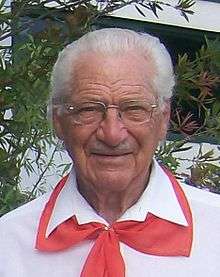Carel Boshoff
Carel Willem Hendrik Boshoff (9 November 1927 – 16 March 2011)[1] was a South African professor of theology and Afrikaner cultural activist.
Carel Boshoff | |
|---|---|
 Carel Boshoff (2009) | |
| Chairman of the Afrikaner Broederbond | |
| In office 1980–1983 | |
| Preceded by | Viljoen, G. |
| Succeeded by | de Lange, J.P. |
| President of the Orania Movement | |
| In office 1990–2007 | |
| Preceded by | Office established |
| Succeeded by | Carel Boshoff IV |
| Personal details | |
| Born | Carel Willem Hendrik Boshoff November 9, 1927 Nylstroom ,Transvaal, South Africa |
| Died | March 16, 2011 (aged 83) Orania, Northern Cape, South Africa |
| Nationality | South African |
| Spouse(s) | Anna Verwoerd |
| Alma mater | University of Pretoria |
| Occupation | Lecturer |
| Known for | Calvinism, Volkstaat (Orania) |
Biography
Boshoff was born in Nylstroom[2] in the Transvaal Province as the second child of Willem Sterrenberg Boshoff and Anna Maria "Annie" Boshoff.[3] Boshoff's mother, Anna, was the second wife of his father; together they had 7 children in addition to the six from his father's first marriage.[1] Carel Boshoff spent much of his youth at his father's ranch in the Waterberg District in the northern Transvaal, attended the University of Pretoria and attained his doctorate in theology in 1951[4] after doing missionary work throughout the old Transvaal Province. He spoke the Sepedi (Northern Sotho) language fluently and served as Secretary of Missions for the Dutch Reformed Church.
Boshoff's wife (also named Anna), whom he married in 1954, was the daughter of Hendrik Frensch Verwoerd who served as prime minister of South Africa (1958-1966) and became known as the architect of apartheid.[5] They had seven children; she died in 2007.[6] Boshoff led the Voortrekker movement from 1981 to 1989.[7] Further, he served as chairman of the Afrikaner Broederbond from 1980 to 1983. He had to leave the Broederbond in 1983, when members of the newly formed Conservative Party were not welcome any more.[8] He chaired the Freedom Front in Northern Cape from 1994.
Boshoff established the Afrikaner Volkswag in May 1984 with the ostensible purpose of defending Afrikaner culture, although in practice it was mainly involved in opposing the liberalising of some racial laws under P.W. Botha. Boshoff had attempted to affiliate his group to the Federasie van Afrikaanse Kultuurvereniginge soon after its foundation but the application was rejected due to the political nature of the Volkswag.[9] The following year he was involved in the setting up of the Vereniging Bybel en Volk, an opposition group within the Reformed Churches in South Africa established after the church leadership endorsed a motion of condemnation of apartheid passed by the Reformed Ecumenical Synod.[10]
In 1988 he founded AVSTIG or Afrikaner Vryheidstigting, although he is mainly known as the founder in 1990 of Orania, an Afrikaner settlement intended as the beginning of a volkstaat. Boshoff admitted his disappointment that it Orania had only 810 residents rather than the 60,000 he had anticipated.[11] In 2004 Orania issued its own currency, the Ora. The area is noted for its Koeksister monument.[12] Boshoff was the president of the Orania movement ('Orania beweging') until 2007. After he became disabled due to illness, his son, Carel Boshoff IV, took over all the above positions.
Death
Boshoff died aged 83 from cancer at his home on March 16, 2011.[13]
Chairmanships
| Position | Organisation | Appointed | Concluded |
|---|---|---|---|
| Chair | Orania Representative Council | 2000 | 2006 |
| Chair | Orania Bestuurdienste (Pty) Ltd | 1990 | |
| Executive Chair | Afrikaner Vryheidstigting / Orania Movement | 1988 | |
| Chair | Afrikaanse Gereformeerde Bond | 1987 | |
| Chair | Die Afrikaner Volkswag (Cultural Organisation) | 1984 | 1999 |
| Chair | Die Afrikaner Broederbond | 1979 | 1983 |
| Founder & Chair | Institute for Missiological Research, UP | 1979 | 1988 |
| Chair | South African Bureau for Racial Affairs | 1972 | 1999 |
| Member | Council Rand College of Education | 1963 | 1979 |
| Chair | NG Kerkboekhandel | 1988 |
See also
References
- "Archived copy". Archived from the original on 2011-10-18. Retrieved 2011-03-16.CS1 maint: archived copy as title (link)
- "Carel Boshoff". Telegraph. 2011-03-17. Retrieved 26 August 2014.
- Carel Boshoff profile
- Grobler, F. (2004). The Afrikaner homeland: a fading dream. South African Historical Organization.
- "Anna Boshoff was a 'community person par excellence'" Archived August 13, 2012, at the Wayback Machine
- "Anna Boshoff was 'community person par excellence'". Mail & Guardian. 10 July 2007. Retrieved 2 February 2018.
- Profile in African Who's Who Archived November 7, 2007, at the Wayback Machine
- Du Toit, Brian M. (December 1991). "The Far Right in Current South African Politics". The Journal of Modern African Studies. 29 (4): 643. doi:10.1017/S0022278X00005693.
- Carole Cooper, Jennifer Shindler, Colleen McCaul, Frances Potter, Melanie Cullum, Monty Narsoo, Pierre Brouard, Race Relations Survey 1985, Johannesburg: South African Institute of Race Relations, 1986, p. 11
- Cooper et al, Race Relations Survey 1985, p. 570
- "Orania, white and blue" Archived August 12, 2012, at the Wayback Machine
- "Kaalvoet women's group honours the koeksister". IOL News. Retrieved 2 February 2018.
- "Notice of the death of Carel Boshoff". Archived from the original on 2012-03-12. Retrieved 2011-03-17.
External links
| Wikimedia Commons has media related to Carel Boshoff. |
| Part of a series on |
| Apartheid |
|---|
|
|
People
|
|
Places
|
|